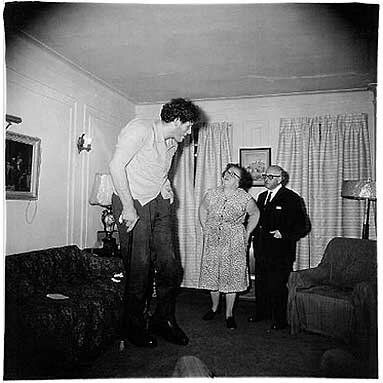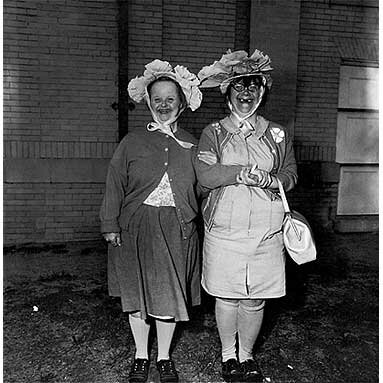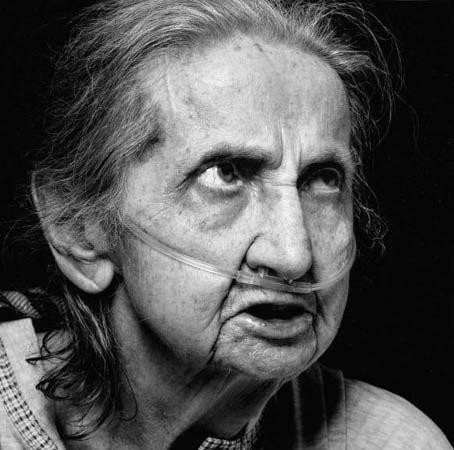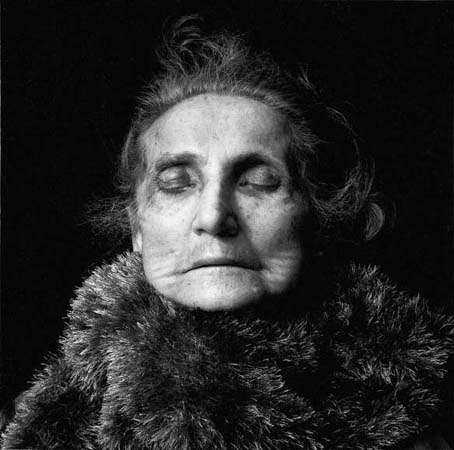Everyone knows about the famous "Work will make you free" inscription that was over the front gate to many concentration camps (most famously at Auschwitz-Birkenau and Dachau). I was still shocked, however, to see this at the front gate of Buchenwald:
 A literal translation? "To each his own." Conversational meaning in German? "Everyone gets that which he deserves." This seems so much crueler, somehow, than that infamous promise of freedom. Remember that the prisoners at Buchenwald were not so literally marched to their deaths as was true at some of the more well-known camps. These were mostly political prisoners, sometimes given menial jobs, but mostly left to freeze, to starve, to rot in the middle of the woods near the single most important cultural capital of the German people. A simple google search of this phrase, and you'll also learn that this was the state motto of the Prussian empire. Although it was a part of the Holy Roman Empire*, Prussia was really the first attempt to unite the "German" people, and had (approximately) the current borders on the west side, but also included Denmark, and reached up along the Baltic Sea through most of current day Poland and. That is, that's how far it spread before Hitler started marching all over the place. So, then, what does this mean? Is it a political statement? Some kind of call to return to the past? Or is it really as backhanded as it seems - a command to shut the hell up? I'm not certain...
A literal translation? "To each his own." Conversational meaning in German? "Everyone gets that which he deserves." This seems so much crueler, somehow, than that infamous promise of freedom. Remember that the prisoners at Buchenwald were not so literally marched to their deaths as was true at some of the more well-known camps. These were mostly political prisoners, sometimes given menial jobs, but mostly left to freeze, to starve, to rot in the middle of the woods near the single most important cultural capital of the German people. A simple google search of this phrase, and you'll also learn that this was the state motto of the Prussian empire. Although it was a part of the Holy Roman Empire*, Prussia was really the first attempt to unite the "German" people, and had (approximately) the current borders on the west side, but also included Denmark, and reached up along the Baltic Sea through most of current day Poland and. That is, that's how far it spread before Hitler started marching all over the place. So, then, what does this mean? Is it a political statement? Some kind of call to return to the past? Or is it really as backhanded as it seems - a command to shut the hell up? I'm not certain...The whole time we were in Buchenwald, I kept thinking over and over: why didn't anyone stop this? I mean, even of people didn't want to see it themselves (and that I totally understand), doesn't there come a time when the desire to look away is overcome by the knowledge that another human being is suffering? Of course, there's a well-known poem (with many many variations) to this effect, from Martin Niemöller:
When the Nazis came for the Communists,
I remained silent;
I wasn't a Communist.
When they locked up the Social Democrats,
I remained silent;
I wasn't a Social Democrat.
When they came for the trade unionists,
I didn't protest;
I wasn't a trade unionist.
When they came for the Jews,
I remained silent;
I wasn't a Jew.
And when they came for me,
There was no one left to speak out.
Regardless of what people then did or didn't do, the monument that finally knocked some sense into me (which I couldn't get a good photo of, but Zach might've?) reads: "So that the generation to come might know, the children, yet to be born, that they too may rise and declare to their children" (Psalm 78:6).** It hit me that I was somehow lucky to be able to see this. Too many Americans will never be able to go there and to look at those spaces where people suffered and died. Too many kids don't hear about the Holocaust (let alone all the things the Soviets did at Buchenwald) save for one week in the year during history class - that if they're lucky, too. My overwhelming sense is that we want too badly to be the heroes of history. The version of WWII that's most popular seems to be Oh, yeah, they were doing some fighting over there in Europe, but we marched in and put an end to all that crap. God Bless America, right?! God forbid we discuss the massive numbers of Russians that died during that giant mess, so that we might look like heroes. And then what of Mussolini and Stalin? Why is Hitler the only example we're given, when he is not the only face of fascism? Why were the events at Abu Ghraib laughed off and then so easily forgotten? What isn't my government telling me about what happens at Gitmo, and why, exactly, are they so opposed to me traveling to Cuba (don't give me that crap about economic embargo. I'm not buyin' it.)?
 Monument for women and girls: No one took their goodbye. No one erected a cross or a stone. But you shall live, as long as people keep your memory. [my translation]
Monument for women and girls: No one took their goodbye. No one erected a cross or a stone. But you shall live, as long as people keep your memory. [my translation]And then, of course, German film... Oh, will you never tire of capturing all the scary, scary things that happen in America? [I hope not]
When I was in Köthen, Jan gave me a bunch of movies to watch. He said it was homework, that these were the things I needed to know about Germany. Admittedly, Jan had a very particular view of what was important about his culture, and a lot of his slant could be attributed to the fact that he worked/works for the German Army. So I watched a lot of movies about Nazis and Punks and being in prison and getting in knife fights. It was exciting. One, in particular, that struck me was Das Experiment. You might've seen it, actually, under the title The Experiment. It was subtitled and released on video, if not run through theaters. It was based on a Stanford U experiment about power, authority, and the sociology of prison interactions. 24 men were paid to take part in a mock-prison situation, randomly assigned as either prisoners or jail keepers, and given minimal supervision. Essentially, things got way out of hand, and the proposed 14-day experiment was called off after only 6 days. Hmm. Stanford University. That's a respectable place with intelligent people. And yet, they allowed men to humiliate and torture each other for six days. Had you heard of it? I hadn't. But every high schooler in Germany learns about the experiment, as well as many of the investigator's buddies' experiments, in their Social Studies classes. Even though it happened in AMERICA - not here.
Take two: Die Welle. Read about this one in the newspaper. It's a German movie with German actors that plays out in Germany, but it's baed on an American high school teacher (Ron Jones) in Palo Alto, California who put his history class to an experiment based on the premise that the Holocaust would never happen in America. People wouldn't go along with the Party, was the claim. And yet, the students created their own Party (the Third Wave), uniform, salute, icon, manner of behavior (including being drilled on entering the classroom quickly and silently), and followed their teacher like good little Hitlerjugend within three days. Heard of it? Nope, me either. There's a movie about it - made in America in 81 but apparently swept under the carpet - and a book, which most German high schoolers read, naturally. Fair enough, I'm sure German kids are sick and tired of hearing about all the awful things their grandparents allowed to happen more than 50 years ago. I get that. In fact, Die Welle did an excellent job of addressing that boredom; at the start of the conversation, which is prompted in the film by a project week on forms of government, one student says, "I'm sick of these damn Nazis. Autocracy. Fine. Can't we talk about the Bush Administration?" Hmm. The Bush Administration, you say. I dare you to find a cross-section of American high school students who would be able identify the ways in which the current government could be considered autocratic or fascist. Anyone think that has anything to do with the fact that we don't talk about autocracy or fascism, or even what real democracy might look like - psst. here's a hint: America's not one! I cannot believe our inability to be honest with ourselves. The first steps to recognizing and putting an end to unhealthy government policies is learning about past mistakes. Allowing a majority of citizens to be and remain disenfranchised, struggling, and hungry, on the other hand, sounds like a fast-track to fascism to me.
Well, this has gone on long enough. Sorry for the rant.
Hearing: Ben Harper.
Reading: Lessons for next week (practicing, really, more than reading...)
Making: Intrelac scarf from baby alpaca yarn.
*PC, remember when I said things in Weimar looked Prussian, and not German? What I couldn't figure out how to articulate then rests here. Prussia was essentially Roman, and not "purely German."
**Without being able to read the Hebrew version, the feeling of the German text on this monument had a different feel to me. Naturally, they used some translation of the bible that they felt was fitting and accurate to the original text, but it was the German that struck me. I would translate it like this: "So that the Generation to come, all the children yet to be born, they too will stand and tell this to their children."
PS. I know, Zach, I know... Just... save it.








